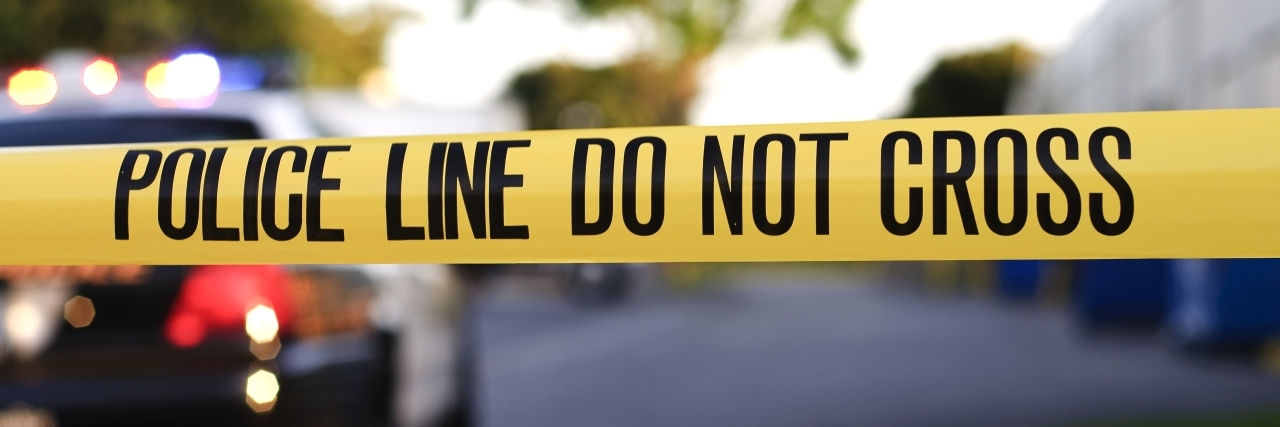Learning to Thrive as a Violent Crime Survivor With a Disability
Editor's Note
This piece includes a description of a home invasion, including details about a gun. If you have experienced violence or abuse, the following post could be potentially triggering. You can contact the Crisis Text Line by texting “START” to 741741.
On Black Friday 2014, my life changed forever.
I woke up early the day after Thanksgiving, November 28, 2014. Like most days in San Diego, California, it was warm and mild; the sun peeked in through my bedroom curtains as I awoke from my post-feast slumber. I realized I wasn’t feeling well and needed to get out of bed, but I’ve had cerebral palsy since birth and use a wheelchair, so I needed help. I called my main personal care assistant — let’s call her Diana, after Wonder Woman — to see if she could come early. Diana had worked for me for five years, and was always there when I needed her, as a supportive friend as well as caregiver. As I lay there waiting for her to arrive, I reflected on my life and how it had changed over the past few years.
In 2011 I escaped from a relationship with a woman who emotionally and financially abused me for years. When I met her, I was a small business owner, just finishing my master’s degree and making plans to start a nonprofit service dog organization. I had never let my disability hold me back, or let anyone get away with mistreating me because of it. I was confident and ambitious, but also devoted and giving to a fault, and she took advantage of that. By the time I managed to free myself, I had become a withdrawn, fearful person who flinched at a raised voice and apologized profusely for even the tiniest mistake. My self-esteem was demolished and my finances decimated.
I had a long road to recovery, but with the support of family and friends, I summoned the long-buried strength deep inside me and resolved to heal. I went to therapy. I got on Social Security Disability and Medi-Cal (Medicaid) so I could apply for California’s home care program, IHSS. I had to fight to get the program’s maximum hours, which still only covered about half the cost of my care. But an online business I’d started during the years I was trapped and controlled suddenly started taking off. I became a blogger, writing about life and travel with a disability. I made friends all over the country, friends who reminded me that I deserved better in life than what I had endured. I also had the unconditional love of my six dogs, who were the center of my world. After three years of struggling to wrest joy from the jaws of despair, I began to feel truly happy again. My new life — my rebuilt life — had finally begun.
And that Black Friday morning, it was about to end.
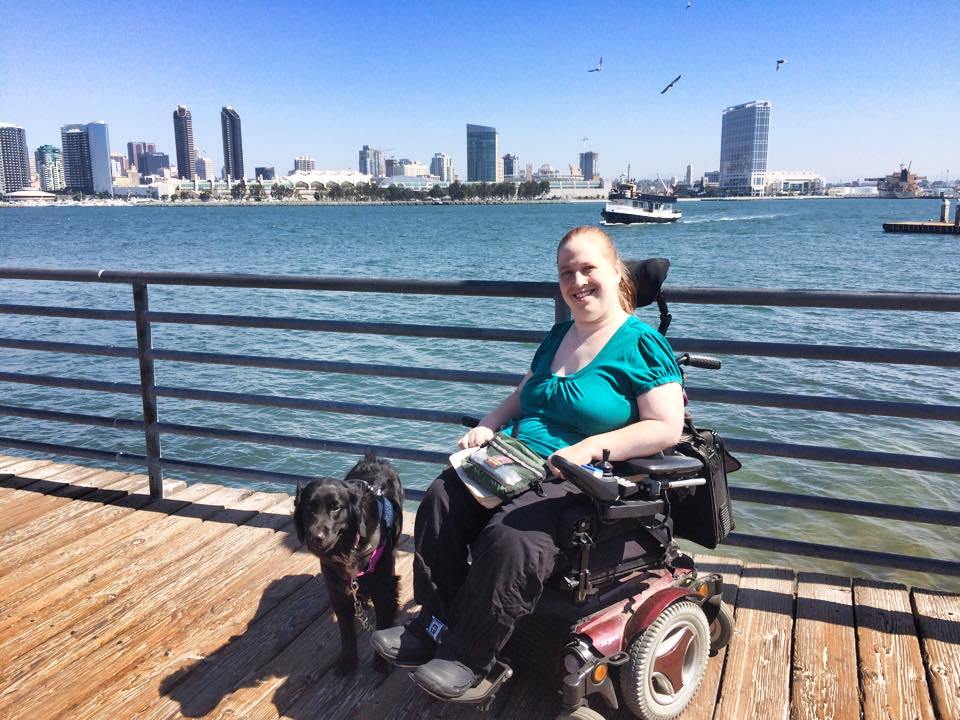
After Diana arrived, she helped me get out of bed, shower and get dressed. We were just discussing where we should go out for breakfast when I heard the keypad lock on my front door beeping.
That was strange. I wasn’t expecting anyone. I turned around, rolled out of my home office and into my living room. That’s when I saw him — a masked man in a light tan hoodie, holding a gun.
I saw him before he saw me. He was opening a bag of dog food, which he poured onto the floor. He was trying to distract my dogs, but most of them just ran from him. The one who would’ve tried to take him down was in her dog crate.
By this time, Diana was shouting at him to get out. “Give me your phones,” he demanded, pointing the gun at me sideways like I’d seen gang members do on “Law and Order.” His accent was strange and muffled.
“I don’t have my phone,” I said, terrified. I quickly realized that if he knew the front door code, he must be connected to someone I knew. I had recently let a couple of assistants go, but I didn’t have any concerns about them, and because it was Thanksgiving I hadn’t gotten around to changing the code. I’d just spent several months of savings on a high-end laptop I needed for my business; I thought that must be what he wanted. I tried to go around him, to flee to my bedroom and lock the door.
He came around behind me and pressed the gun into my neck, then cocked it. I’ll never forget the feel of that cold metal, or the click of the barrel. Again he demanded my phone, but I said I didn’t have it. Then suddenly he unfastened the seat belt that kept me in my wheelchair. He grabbed me under my arms and threw me onto the floor. I don’t think I even screamed. Was he going to shoot me? Rape me? I was completely helpless.
I saw him walk away from me and hold the gun on Diana. He made her walk down the hall, and I heard my bedroom door open. It seemed like hours passed, and then I heard bare feet pounding on the floor. I saw Diana run out the door with the attacker chasing her.
I waited for screams, or gunshots. None came. It was eerily silent. Had he kidnapped her? Was he coming back for me?
After a couple minutes passed, my service dog ran up to me and started licking my face. I realized I had to try to crawl to the door and scream for help. I was struggling to roll over when a man I didn’t recognize appeared in my doorway. “Please don’t hurt me!” I cried, but he assured me he was a neighbor who had seen the commotion. Another neighbor, a young man I knew quickly arrived to help as well. They lifted me back into my wheelchair as I asked tearfully whether they had seen Diana. The younger man told me that she was safe at his house with his mom, calling 911.
The police came, and the media. I had to tell my story several times, and struggled to stay calm as I called my father and closest friends. I hugged Diana over and over. He had held her at gunpoint, and she was terrified he would shoot her — either on purpose or by accident. He kept cocking the gun, and it expelled an unfired bullet as he yelled at her not to move. When he turned away to pull the box with my worthless costume jewelry out of the bathroom cabinet, she saw an opportunity, grabbed her little dog and ran. She had saved us both.
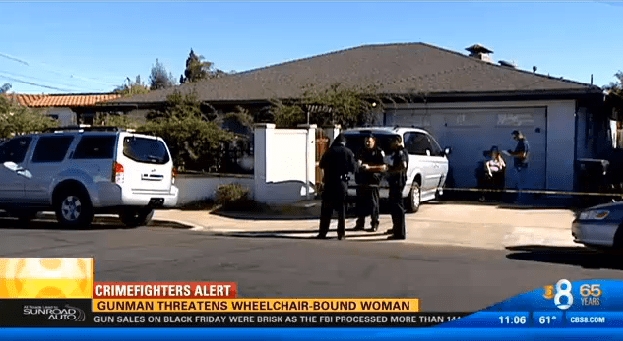
Who could have done this?
In the hours after, Diana and I tried to solve the mystery of who had attacked us. I had recently let two caregivers go who weren’t working out. One had been angry, but we couldn’t stop thinking about the other one — the quiet one, Jennifer. We also wanted to know why the attacker didn’t seem to respond when we spoke to him. I had noticed it, and Diana had too when she was alone in the bedroom with him. Then I started thinking about something Jennifer had told me — her boyfriend was deaf.
Suddenly all the pieces fell into place. I texted a hard-of-hearing friend with details about our ordeal, and she agreed that the attacker was probably deaf. Diana and I told the police, who promised to look into it. I gave a brief interview to a TV reporter; I wanted the world to know what happened, and hoped it would prompt a witness to come forward. Later that night, we were sitting in a Chinese restaurant when the story came on the news, and all the customers stared at me. Perhaps they wondered why I was out to dinner after going through such trauma, but the last place I wanted to be was home.
That night, Diana and her friend stayed with me, armed with pepper spray and a registered handgun. As I drifted off to sleep with the help of anti-anxiety medication, I felt surprisingly hopeful. I was confident the police would catch the attacker, and everyone assured me that people who break into houses never come back. I had no way of knowing my nightmare was just beginning.
The next day, I did all the things they say you’re supposed to do after being the victim of a crime. I went to see my therapist. I bought security cameras. I knew I wouldn’t feel safe being alone for a long time, so my best friend came to stay with me for a night, and my father planned to fly in the following day. I tried to convince myself not to worry. But then I got a phone call from Home Depot’s fraud department, asking whether I had just purchased two gift cards. I had not.
The card in question was in my wallet; I had used it to purchase the security cameras that morning. But when I called the credit card company, they confirmed there were more fraudulent charges, from Walmart and a personal information search service. I felt the hair on the back of my neck stand up as I realized this was no coincidence; whomever arranged the robbery had copied down the credit card number while still working for me. I immediately contacted the lead detective, who promised to look into it immediately.
The next day I called my IHSS caseworker and left a message, alerting her that a caregiver registered with the state of California was almost certainly responsible for the violent attack I had suffered. I gave her Jennifer‘s full name and contact information and asked her to put an alert in the system to make sure she could not work for anyone else. By the end of the day, no one had called me back. Despite repeated attempts to reach my caseworker, I wouldn’t receive a call back for almost three months.
I thought it was over…
I decided to go out to dinner with Diana and her daughter so I wouldn’t be alone while I waited for my father to arrive later that night. As we were waiting for our food, I took out my phone, and that’s when I saw the email. I started reading it out loud, not realizing what I was saying, not even seeing the look of horror on Diana’s and her daughter’s faces. The writer claimed to be part of a group of mercenaries who were hired to attack me. They said I was supposed to be alone and I was lucky that Diana was there. They said now a “secondary arrangement” was in effect: I was to send them $17,000 in gift cards, or they would kill my friends, family and dogs. To back up their threat, they included personal and contact information for my family and some friends, taken from social media and the database search service that was paid for with my stolen credit card number. They said if I involved the police, or if any of them were arrested, they would retaliate.
As I read the letter, I felt my entire world crumble around me. My life had turned into something out of a bad TV movie, but it was all too real. I immediately called the detective again, and that night my father and I checked into a hotel. The next morning I scrambled to find a safe place for my dogs to stay. None of us would ever spend another night in that house. The police assured me they were working hard and thought they would be able to catch those responsible, but I knew they couldn’t protect me in the meantime. I realized I had no choice but to move away from San Diego forever.
A few days later I packed my most important possessions as an armed guard stood in my living room, still not knowing who had attacked me or why. I had to leave my friends behind, find homes for two of my dogs, and sell my house. As terrible as all that was, I felt the worst about leaving Diana. She had risked her life to save us, expecting at any moment that the attacker would shoot her in the back as she escaped. How do you ever thank someone enough for that kind of bravery?
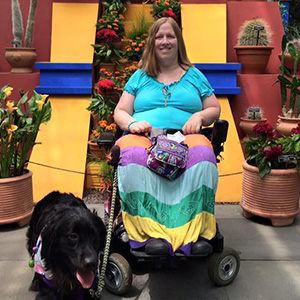
Surviving was the easy part.
I moved to a place where I would be safe and near family, though not a place where I wanted to live. It’s been better than I expected, but I still wrestle with my decision to this day and have many regrets. Moving is extremely complicated when you have a disability and require Medicaid home care services. You can’t simply transfer services, you must apply in the new state and somehow cover the cost of your care for the months it can take to get approved. Services are different in each state, so you could end up getting far fewer hours of care, or even put on a waiting list to get any care at all. I have excellent support for home care here, and far more hours than I got with California, plus a caseworker who always returns my calls. But I ended up in debt after having to pay for my care out of pocket for months.
In January 2015, the man who invaded my home was arrested and charged with the robbery and subsequent death threats. I felt some relief, but it wasn’t enough. I knew his girlfriend Jennifer was the one behind the attacks, so I continued pushing the police to investigate her. She had already been arrested for another despicable crime, burglarizing people’s homes while they were at loved ones’ funerals, but they eventually charged her in my case. She and her boyfriend both received long prison sentences and were ordered to pay restitution in the tens of thousands, but I doubt I’ll ever see any of it.
I’m safe for now, but my mind doesn’t always realize that. In the weeks and months after the robbery, I struggled with post-traumatic stress disorder (PTSD). Every time the nice man who was remodeling my new house passed by my window, my heart would start pounding because he wore a light tan hoodie like the attacker. Every sound made me jump out of my skin. Even my service dog struggled, barking at people and dogs when she never had before. It has gotten better over time, but I still carry the emotional scars. Sometimes I still get the phantom sensation of cold metal pressing against my head where he held the gun, and the spot often hurts even though I wasn’t shot. I still have panic attacks, rarely sleep well, and get my best sleep in hotel rooms because they’re not my home. The very concept of home has been shattered for me, and although I’ve worked hard to repair it, there are still a few pieces missing.
I can’t escape from certain triggers. I will always need personal care assistants, and it’s terrifying every time I have to hire someone new. I never know if they could be another Jennifer, who passed the background check and state registration process but was a predator in disguise. I believe we need higher wages for state-funded home care providers to attract quality workers. We also need a nationwide database for reporting personal care assistants who abuse and exploit their clients, and enhanced criminal penalties to make us less appealing targets. I still wonder if Jennifer harmed anyone else before me, someone who couldn’t speak for themselves or was too afraid to tell anyone. I still worry about what will happen when she and her boyfriend are released from prison.
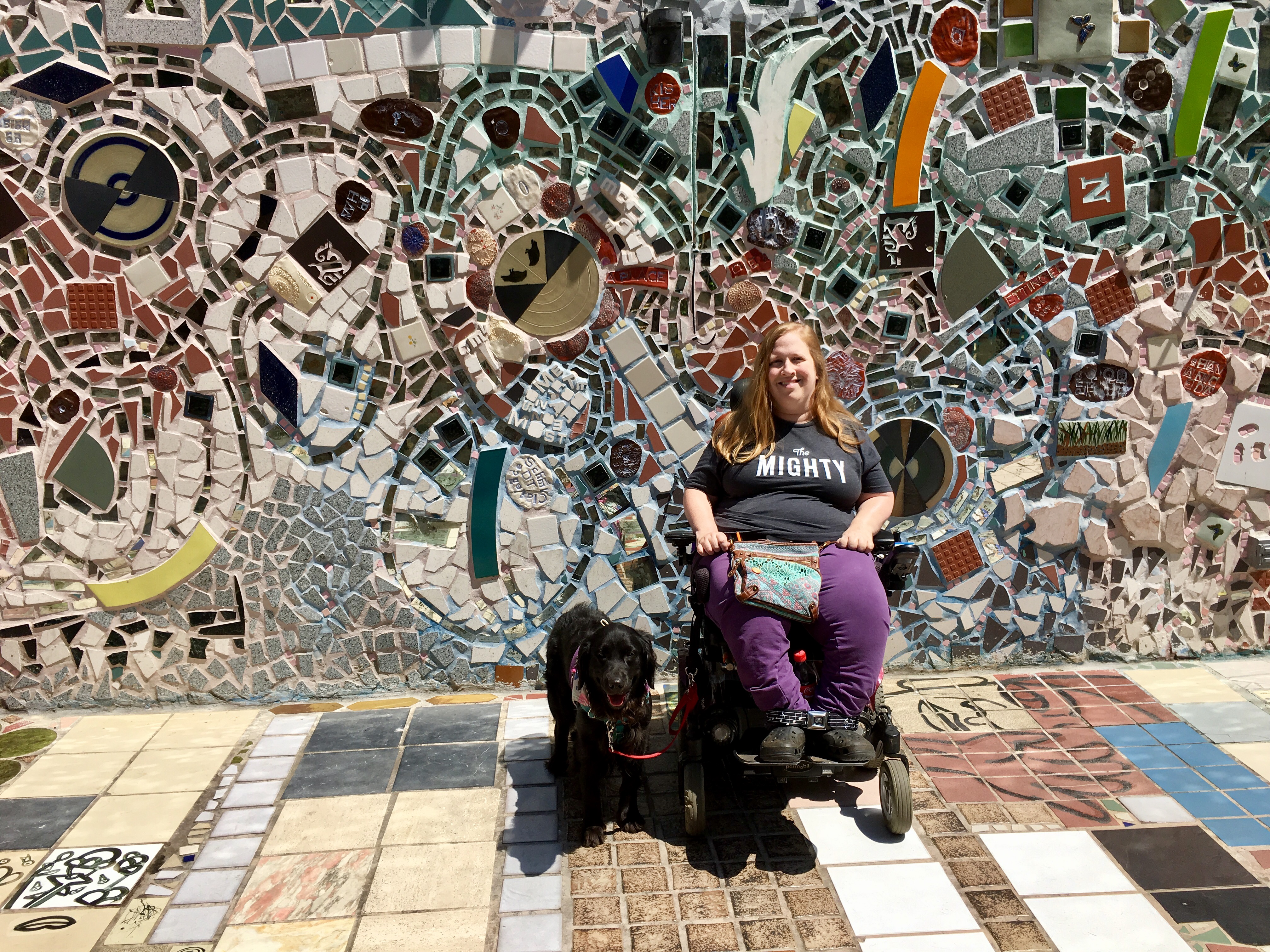
I find support in unusual places.
I’ve found a surprising shortage of support spaces for people who survived violent crimes such as what I experienced. Many online communities are for people who survived sexual assault, and although I feel a connection when I read their stories, my experience was different and I don’t want to tread on their spaces. And my trauma is complex, because even though there was no connection between the domestic violence I experienced and the robbery, they have compounded each other. I struggle with the fact that the man who attacked me was deaf. Why would a disabled person choose to target another, knowing how many struggles we already go through to succeed in the world? It’s difficult for me to trust anyone new now.
I do find support, but it’s often in places I never would have expected. I have always enjoyed police procedural shows like “Law and Order” and “Criminal Minds,” and that hasn’t changed. Since being attacked I started listening to true crime podcasts, the very thing you might think I’d want to avoid. But I’ve heard so many people say they feel empowered by listening to shows like “My Favorite Murder” and “Real Crime Profile,” so I know I’m not alone. I think they help us to remember we’re not the only ones who’ve endured trauma at the hands of another, and teach us how to spot the warning signs and hopefully avoid the next predator who would make us a target. Most importantly, they remind us that we are not the ones at fault for what happened to us. It’s important to be aware and protect yourself, but ultimately those who choose to take advantage of other people are the ones we must hold accountable.
I have to believe it’s all going to be OK.
As I come up on the fourth anniversary of surviving being attacked, I’m struggling to sleep and jumping at every tiny noise outside. My chronic pain is magnified; my chest is tight, and even my weighted blanket only takes the edge off my anxiety. My body remembers what happened, and it won’t let me forget. Still, I’ve come a long way, and I can say honestly that my life is better now than it was last year, and the year before that. I’m healing in my own way and in my own time.
I have supportive friends and family, and four large, protective dogs who help me feel safer than I would otherwise. I have a fulfilling job here at The Mighty, and as I read everyone’s stories, I see just how many of us are struggling, and how many of us are finding a way through. I continue to travel as often as I can and blog about it, as well as sharing my experiences as a survivor. I’ve become a passionate advocate, raising awareness about violence against people with disabilities. Although my story is an unusual, headline-grabbing case, almost every disabled person I know has been abused physically, emotionally and/or sexually — often by someone they trusted. In many cases they kept quiet out of fear, or when they spoke up they weren’t believed. We must believe and support survivors, and stop making excuses for abusers.
Like everything else I’ve been through, I am determined not to let being the victim of a violent robbery also steal my joy. I’m a survivor, and I will thrive no matter what it takes.
Getty image by AIJohn784.
Follow this journey on Free Wheelin’.

